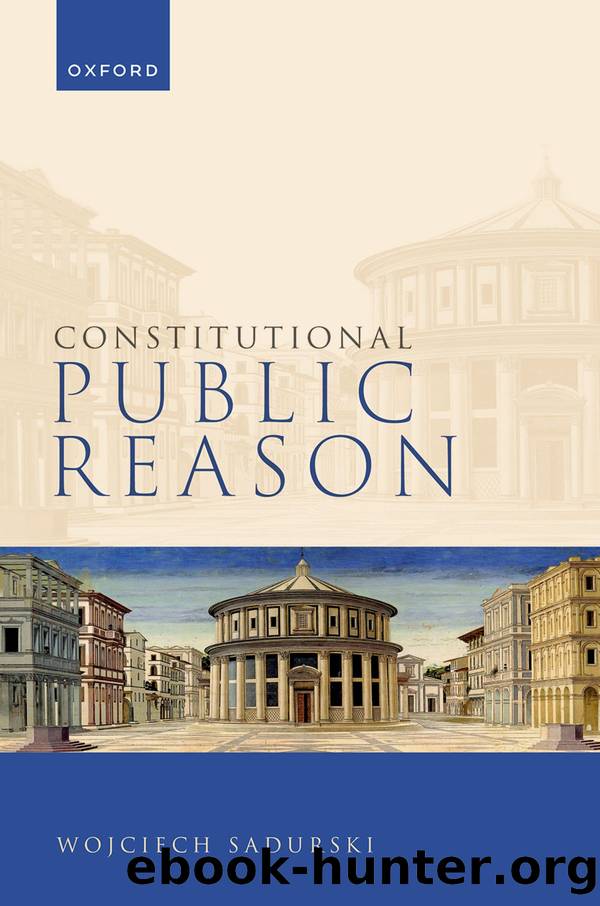Constitutional Public Reason by Sadurski Wojciech;

Author:Sadurski, Wojciech;
Language: eng
Format: epub
Publisher: Oxford University Press, Incorporated
Published: 2022-03-15T00:00:00+00:00
Another legal system in which an idea similar to âviewpoint neutralityâ can be seen is New Zealand. In a comment on the High Courtâs decision about a swastika display on a residential house,34 Bede Harris, a legal scholar, used terms identical to the âviewpoint neutralityâ discourse in criticizing the judgment. While agreeing with the outcome (the Court upheld a ban on swastikas), Harris claimed that a similar conclusion could have been reached âon considerations of time and placeâ, and without any regard to the content or the viewpoint of the expression. âThe issue of viewpoint neutrality is central to freedom of expression, yet was not addressed in the judgmentâ, Harris deplored, and added: â[t]he result was a decision which, by restricting the ambit of permissible expression to what conforms to prevailing notions of ideological acceptability, quietly legitimated viewpoint censorship.â35 Regardless of the merits of this argument with regard to that particular court judgment, it is clear that by using the harsh notion of âviewpoint censorshipâ, the author endorsed a position of strong distaste towards regulating the speech based on the viewpoint it expresses.
The distinction between viewpoint neutrality and subject-matter neutrality makes good sense if we adopt the template of a motive-oriented approach to freedom of speech jurisprudence. It is not the case that subject-matter regulations do not implicate motive scrutiny, or even that they necessarily implicate motive scrutiny to a lesser degree than viewpoint regulations. But in real life, viewpoint regulations evoke improper motivations more urgently and obviously than subject-matter motivations. Geoffrey Stone captured this difference well when saying that âthe probability that an improper motivation has tainted a decision to restrict expression is far greater when the restriction is directed at a particular idea, viewpoint, ⦠than when it is content-neutralâ36 (note, incidentally, the unfortunate tendency to contrast the viewpoint approach to content neutrality as if these two options exhaust the possibilities, thus leaving subject-matter restrictions outside the dichotomy). The main point I am making here is that, within a subset of content regulations, viewpoint regulations implicate and reveal different motivations than subject-matter regulations do, and that this more invidious character of the motivations triggering viewpoint regulations explains our higher degree of hostility towards viewpoint than towards subject-matter regulations.
A hint about the nature of the difference may be suggested by an already quoted phrase in Justice Stevensâ concurrence in R.A.V.: âsubject-matter regulations generally do not raise the same concerns of government censorship and the distortion of public discourse presented by viewpoint regulations.â37 These two defects of viewpoint regulations (governmental censorship and discourse distortion) are allegedly missing from subject-matter regulations. But if so, then what is the concern about subject-matter regulation that triggers a higher scrutiny than content neutral regulations (i.e. regulations of time, place, and mannerâwhich, after all, may greatly reduce the circulation of ideas and information), though admittedly lower than for viewpoint regulations? There must be something about subject-matter regulations that makes them symptomatic of some wrongful governmental motives, but not that wrongful as is for restrictions based on viewpoint.
Download
This site does not store any files on its server. We only index and link to content provided by other sites. Please contact the content providers to delete copyright contents if any and email us, we'll remove relevant links or contents immediately.
Day by Elie Wiesel(2786)
The Age of Genius by A. C. Grayling(2592)
Gideon's Spies: The Secret History of the Mossad by Gordon Thomas(2355)
The Gulag Archipelago (Vintage Classics) by Aleksandr Solzhenitsyn(2106)
FATWA: Hunted in America by Pamela Geller(2013)
Columbine by Dave Cullen(1870)
Men Explain Things to Me by Rebecca Solnit(1729)
The Rule of Law by Bingham Tom(1701)
Anatomy of Injustice by Raymond Bonner(1671)
Examples & Explanations: Administrative Law by William F. Funk & Richard H. Seamon(1649)
Three Cups of Tea by Greg Mortenson(1620)
The Source by James A. Michener(1619)
That Every Man Be Armed by Stephen P. Halbrook(1584)
ADHD on Trial by Michael Gordon(1581)
Future Design by Unknown(1580)
Gideon's Spies by Gordon Thomas(1512)
Palestinian Walks by Raja Shehadeh(1499)
Constitutional Theory by Carl Schmitt(1458)
Nothing to Envy by Barbara Demick(1451)
